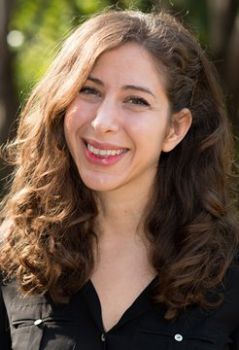Neuroscientist named as global rising star by top academic publisher
By: Neil Vowles
Last updated: Monday, 24 September 2018

University of Sussex neuroscientist Dr Sarah Garfinkel has been included among the prestigious Nature Index 2018 Rising Stars.
A University of Sussex neuroscientist has been named as an emerging leader in her field by the world's leading multidisciplinary science journal.
Dr Sarah Garfinkel has been included in the prestigious Nature Index 2018 Rising Stars as one of 11 outstanding early to mid-career scientists from around the world who are bringing fresh ideas to their discipline.
A Senior Lecturer in Psychiatry and Consciousness Science based at Brighton and Sussex Medical School and the Sackler Centre for Consciousness Science at the University of Sussex, Dr Garfinkel is one of the world’s foremost experts on the health consequences of interoception - the sensation of feeling the activities of one’s internal organs.
Dr Garfinkel said: “I feel very lucky to be singled out - there are so many amazing scientists doing such wonderful work all around the world and they deserve recognition too. It feels quite surreal and dream-like, to get this recognition is the most wonderful feeling.
“Behind every successful scientist there are supportive mentors and I wouldn't be here today without the support and inspiration of Professor Hugo Critchley who has always believed in me and gave me the support and space to develop as a scientist. My success is a reflection of his support and now, as I mentor others, I hope to be able to do the same for them.”
Dr Garfinkel joined the University of Sussex in June 2011 having gained her postdoc at the University of Michigan where she initially studied memory recall among military veterans suffering from PTSD before switching her focus to the role the heart plays in emotional processing.
Her research at Sussex centres on the body-brain interactions underlying emotion and cognition and investigating how individual differences in the detection of internal bodily sensations can influence emotion and memory.
Her work explores how aberrant bodily and neural mechanisms can contribute to symptom maintenance in psychiatric conditions such as anxiety, PTSD, autism and schizophrenia.
With Prof Critchley, Postdoc Lisa Quadt and PhD student James Mulcahy, Dr Garfinkel is currently researching whether an innovative psychological therapy can reduce the number of people with autism who develop an anxiety disorder.
The spotlighted scientists have been praised by Nature for bringing fresh ideas to their disciplines which Dr Garfinkel suggests in her case could be attributed to her dyslexia which she says taught her perseverance and determination.
She said: “So many people can be held back because they are striving for perfection, where I never had that problem because nothing I ever did was perfect. I never got the best marks at school, I really struggled in exams. I even failed my first exam at university. So I leant just to do the work because I was curious and because I loved it, and I guess that’s still the case now. Thinking back to my early days growing up, when no-one saw me as academic, it makes me feel quite moved. I wish I could go back in time and tell my younger self that it would all be ok.”
Nature selected Dr Garfinkel and ten peers from among 500 scientists assessed using the power of the Nature Index and the League of Scholars Whole-of-Web (WoW) rankings.
Candidates had to be active researchers who have published at least one paper in the 82 index journals in 2017 and whose first scientific paper appeared less than 20 years ago.
The top 11 scientists have a year-on-year citation growth, and scored exceptionally in the WoW ranking, which identifies the most influential researchers using an algorithm similar to Google’s PageRank which considers the quality of a scientist’s output, links to industry, and co-authorship networks.
Prof Critchley, Co-Director of the Sackler Centre for Consciousness Science and Head of Department of Neuroscience at Brighton and Sussex Medical School, said: "We are all very proud of what Sarah has achieved with the University of Sussex, Sackler Centre for Consciousness Science and BSMS. Her fresh insights into the two way interplay between bodily arousal and emotion have reinvigorated a field that had become somewhat stagnant. Her research has also formed the basis of a series of large grants, but perhaps most importantly has been applied to understanding and even treating patients through her focus on body-to-brain communication. Sarah is also a great communicator of science, her contagious enthusiasm for her work shines through."
